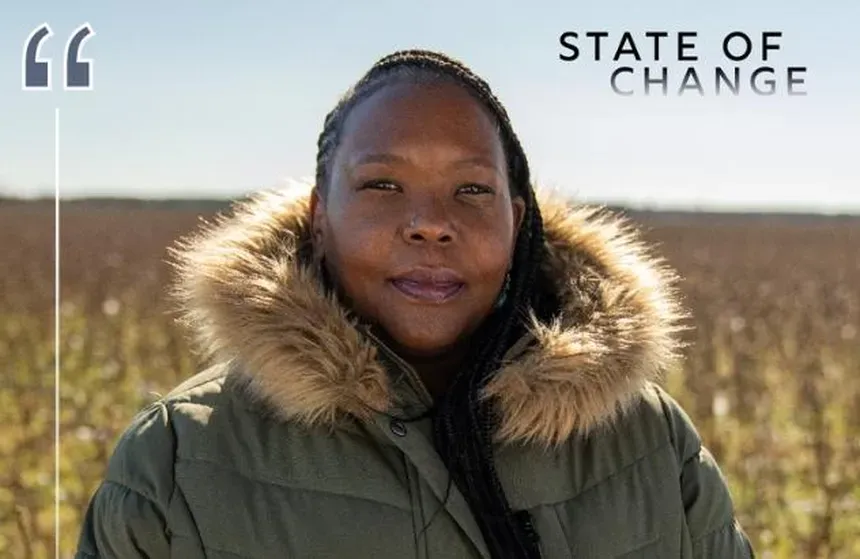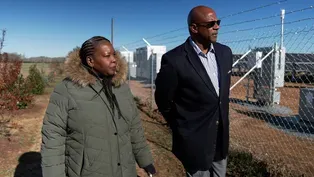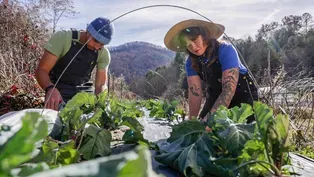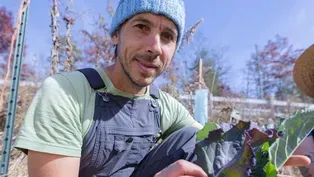
Altapass Orchard: Conserving Land for Climate Resiliency
Clip: Special | 7m 52sVideo has Closed Captions
Land conservation is not a “one size fits all” solution. This orchard shows us one way.
The Blue Ridge Parkway is known for its views, but the surrounding land is privately owned, meaning it could be developed. Learn how Conservation Trust for NC works with property owners to protect the land, conserving views and habitat for wildlife impacted by climate change. Plus, pay a visit to the Historic Orchard at Altapass to see how land conservation doesn’t mean land untouched by humans.
State of Change is a local public television program presented by PBS NC
State of Change is part of the Pulitzer Center’s Connected Coastlines reporting initiative. For more information, go to https://pulitzercenter.org/connected-coastlines.

Altapass Orchard: Conserving Land for Climate Resiliency
Clip: Special | 7m 52sVideo has Closed Captions
The Blue Ridge Parkway is known for its views, but the surrounding land is privately owned, meaning it could be developed. Learn how Conservation Trust for NC works with property owners to protect the land, conserving views and habitat for wildlife impacted by climate change. Plus, pay a visit to the Historic Orchard at Altapass to see how land conservation doesn’t mean land untouched by humans.
How to Watch State of Change
State of Change is available to stream on pbs.org and the free PBS App, available on iPhone, Apple TV, Android TV, Android smartphones, Amazon Fire TV, Amazon Fire Tablet, Roku, Samsung Smart TV, and Vizio.

Explore More from State of Change
Hear from North Carolinians about climate change effects & innovative solutions across the state.[light music] - Our climate is changing.
We are dealing with the effects of that.
We're seeing increases in rainfall and precipitation.
We're seeing flooding.
We're seeing increase in heat.
We think about high fire risk.
We think about, how are animals gonna be able to migrate as their climate changes and the temperatures change?
Land is going to help address all of those issues.
What we can do right now is plan for the future and really save these special places so that they have somewhere to go and that we have something addressing the impacts that climate change is bringing forward to the state and the people in it.
[light music] Where we're located right now is the Blue Ridge Parkway, which is a unit of the National Park Service.
The views on the parkway are not guaranteed.
There are lots of places along the parkway that are not under conservation permanent protection.
What makes this unit really unique is that it does not take federal government action to expand the park boundary.
All it takes is a cooperative partnership between the Park Service and a land trust like CTNC.
So what we've been doing for over 20 years now is working with private landowners to acquire land.
Then we hold and steward it until the park service is ready to take it on and add it to the park.
Everything you're looking at right now is protected by a partnership between CTNC and the orchard.
- We bought the orchard in 1995.
My sister, she came from Eastern North Carolina.
She read the want ads, and she saw this orchard advertised for sale.
I asked her what she was gonna do with it and she said, "Nothing.
I'm gonna make sure this beautiful place is not ruined by a lot of construction and houses and things like that."
[upbeat music] - The motto for this orchard is saving the good stuff, and the good stuff is just what we're looking at, the views and the trees and the heritage apples, that the rich history that exists here.
That is what we are trying to protect here.
People want to be out here and pick their own apples and taste them off the tree.
They're getting a whole new taste of an apple.
[apple crunching] Oh, that's good.
- Conserved land does not have to be locked up and put away.
Conserved land can absolutely be creating a space that is used.
We're in an agricultural production space right now.
Conserved land can be done with farmers, it can be done with parks and public land and trails.
But it can look different for everybody.
- There, that's the one I want.
- So what you wanna look for on these are these red places we call the red blush.
That's where the sun has kissed the apple, basically.
I'm always telling local people, if you wanna know your story, if you wanna know your history, come to the orchard because that's where it all is.
The orchard is home to me.
That's the best way I know to say it.
Physically, home is on this mountain straight behind us.
That's where I grew up and I live very close to where I grew up now.
My great uncle raised his family in the house right out here.
That is now where my office is.
So the history there runs thick in my family.
I can tell you that winters are not anywhere near as severe as even when I was growing up 20 years ago.
Not every winter's the same.
Some are worse than others.
Some are more mild, but it has definitely changed.
More concerning than the winter changing is what we're seeing in the spring.
What sometimes happens is it gets warm a little early in the season.
Those blossoms come out and a week later it gets down to 25, 27 degrees one night.
And it sends apple orchardists into panic because that can kill your apple crop.
Here in the mountains, we get frost up until mid-May.
So, a couple weeks early with things blooming out can make a big difference.
If you look around, you're gonna see that there are mountains taller than us in any direction that you look.
Because of where we are in this pocket in the mountains, we have warm air that comes up from the valley below us and rises up over the apple trees.
9 times out of 10, this bowl here in the mountains and the movement of warm air saves our apple crop from frost and freeze damage.
It can happen and it has happened, but it is not as prevalent as a lot of other orchards in the area because of this location.
And that is why the railroad specifically planted it here.
A lot of people say, why in the world did they put this orchard on the side of the continental divide?
But that's why.
- In this part of Western North Carolina, if you look at what the data is telling us, it's telling us this is highly resilient to change, but it's also highly impacted and threatened by the impacts of climate change.
[light music] As climate changes, we need to give our plants, animals, and wildlife time to adapt, and the way we can help them adapt is giving them places to go so that they can follow that habitat and resource they need to continue to thrive.
In order to do that, we need contiguous connected plots of land.
The Blue Ridge Parkway is so unique because we have essentially created over 400 miles, north to south, that has created that connected land that is gonna give them that extra fighting chance to get where they need to go while the climate's changing.
[light music] - It rejuvenates your spirit to know that you're saving something that's so important to nature and our ecosystem.
The air we breathe, the beauty that we see in the mountains behind us, everything is so much bigger than you are as a person.
- I have a family reunion every summer and when folks come in that are maybe in their 70s and have moved away and haven't lived here since they were a kid, and they drive through the community, they can't believe all the houses and buildings and structures that have popped up in 60 years.
While that's just part of life, that development, at the same time, we need places where we save history and the land, the trees.
It's very important to me.
This orchard is my life.
It's my passion to see that it's saved forever.
- [Beth] We can't take credit for this, but we can certainly take the responsibility and the stewardship to protect it.
[light music] [light music]
EnerWealth: Growing Solar Options in Rural Communities
Video has Closed Captions
EnerWealth works with rural farmers in NC to ensure they get a piece of the solar pie. (8m 12s)
Preview | State of Change: Seeds of Hope
Video has Closed Captions
Meet the North Carolinians who are adapting to climate change in new and inspiring ways. (30s)
Utopian Seed Project: Rethinking Our Food System
Video has Closed Captions
The Utopian Seed Project works to build NC’s climate resiliency through crop diversity. (10m 17s)
Providing Support for PBS.org
Learn Moreabout PBS online sponsorshipState of Change is a local public television program presented by PBS NC
State of Change is part of the Pulitzer Center’s Connected Coastlines reporting initiative. For more information, go to https://pulitzercenter.org/connected-coastlines.














